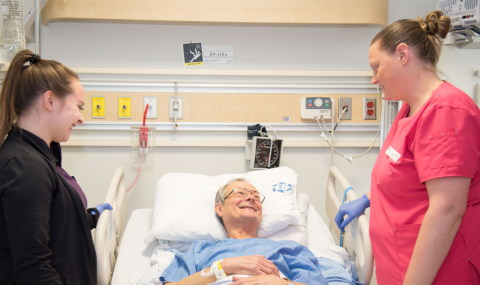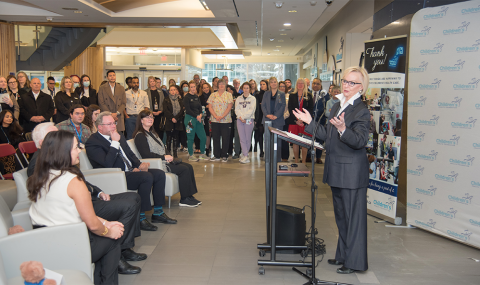May 7, 2015
The new Transplant Immunology Laboratory has been officially welcomed at London Health Sciences Centre’s (LHSC) University Hospital by staff and physicians of Pathology and Laboratory Medicine (PaLM) and the Multi-Organ Transplant Program (MOTP).
The Transplant Immunology Laboratory investigates a patient’s HLA antigens and antibodies, while on the transplant waiting list, to find compatible donors and also monitors patients post-transplant for signs of organ rejection. Cardiology, endocrinology, and hematology also receive tests results from the laboratory.
Operating since July 2014, the official welcoming of the new space was delayed to mark a few milestones. “This celebration has been a long-time coming. We took time to settle-in and learn the intricacies of the new space. We also wanted to take the opportunity to jointly welcome Dr. Qingyong Xu, the new director of the Transplant Immunology Laboratory,” said Dr. Mike Kadour, Director, PaLM.
Dr. Xu joined LHSC from the St Paul's Hospital HLA Laboratory in Saskatoon where he was the lab director and a Clinical Assistant Professor of the Department of Pathology and Laboratory Medicine at the University of Saskatchewan. “We have the opportunity to use this new laboratory, this technology and this equipment to make a vital difference in the care of transplant patients,” said Dr. Xu.
The official opening of the laboratory was marked by an open house with staff and physicians from PaLM and MOTP touring the space and learning about the technological advancements made in antigen and antibody testing. Although smaller than the space the previous laboratory occupied, every detail of the new space was meticulously planned to create better flow and efficiency for the laboratory technologists.
“We were in our previous space since the mid-1990s. Then, the waiting list for a kidney transplant was 10 to 15 people. The waiting list is now 80 to 90 people and the technology has come a long way. We worked diligently to ensure a seamless transition into the new laboratory while continuing to deliver high-quality, timely and accurate results,” says Dr. Subrata Chakrabarti, Chair/Chief Pathology and Laboratory Medicine, LHSC and St. Joseph’s Health Care London. “The transition would not have been possible without the support of our Multi-Organ Transplant Program partners and colleagues.”
Larger transplant lists mean that more testing is required to match donors, organs and recipients. The Transplant Immunology Laboratory operates 24 hours a day, seven days a week, and conducts several thousand antigen and antibody tests a year to ensure that the donor organ and recipient are a match and to ensure that there are no hidden antibodies that could mean the recipient rejects the organ.
“This laboratory is essential to transplantation by providing real-time information that helps us determine whether the recipient can successfully accept the organ,” says Dr. Andrew House, Chair/Chief Nephrology, LHSC. In a process that involves transporting cells and organs throughout a wide geographical catchment area, time is of the essence. Advanced testing means less time is spent finding a donor and recipient match. The benefit to faster and more accurate testing is that the organ spends less time on ice, begins working faster, functions better, and ultimately, a higher functioning organ reduces the recipients length of stay in hospital.
“Accurate information allows surgeons to conduct a transplant with greater confidence and also influences the course of action for immunosuppressant drugs after the transplant,” adds Dr. House.
See more photos on LHSC's Facebook page from the official welcoming.
From left, Dr. Qingyong Xu, Glen Kearns, Dr. Mike Kadour, Dr. Subrata Chakrabarti celebrate the official opening of the Transplant Immunology Laboratory at University Hospital.



